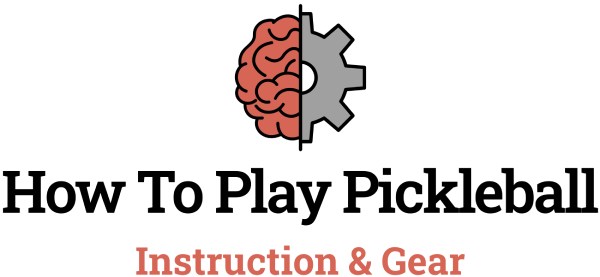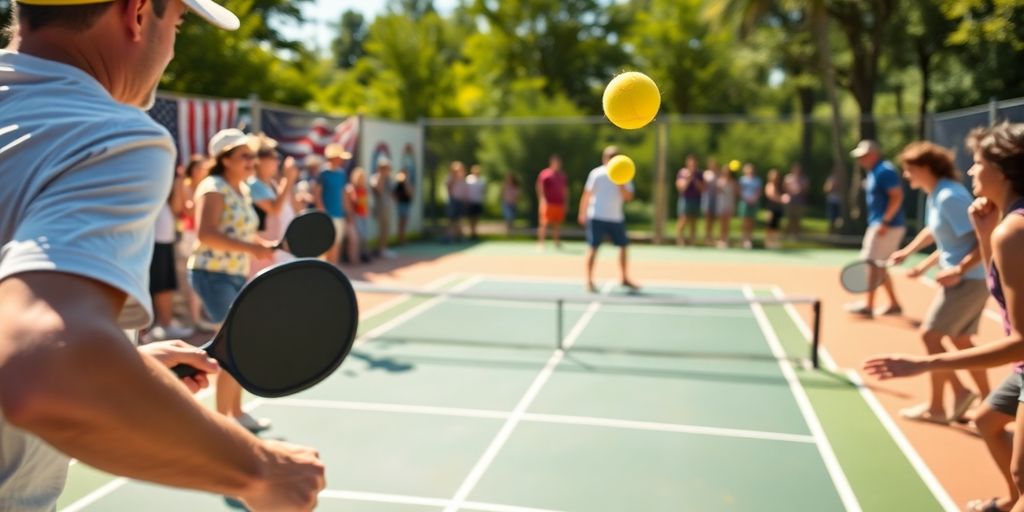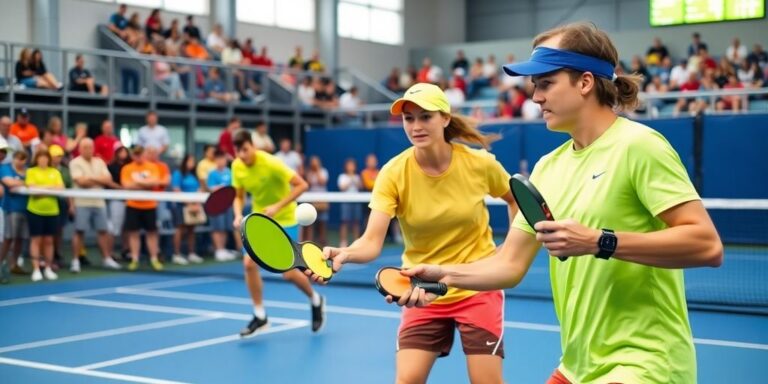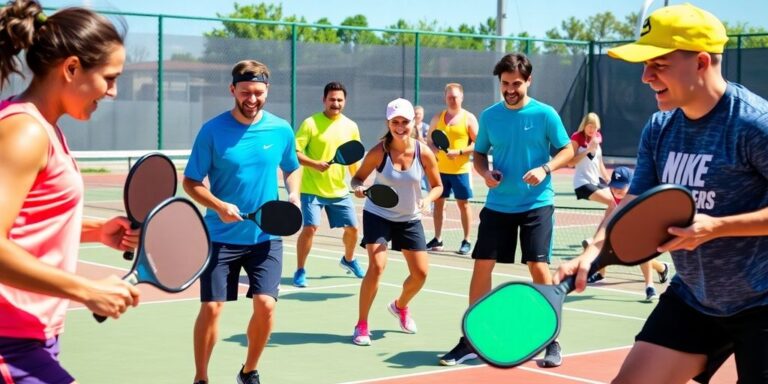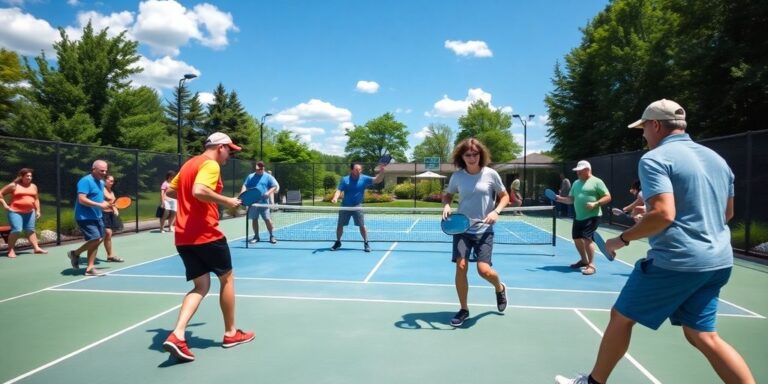Pickleball has become a household name in the world of sports, but the story behind its quirky name is just as intriguing as the game itself. Originating in the mid-1960s, this sport blends elements of tennis, badminton, and ping-pong, making it accessible to players of all ages. Yet, many people still scratch their heads and wonder, why is pickleball called pickleball? This article aims to uncover the fascinating history and various theories surrounding the name, diving into the origins and the cultural impact of this beloved game.
Key Takeaways
- Pickleball was invented in 1965 on Bainbridge Island, Washington.
- Two main theories suggest the name comes from a family dog named Pickles or a rowing term ‘pickle boat’.
- The sport has evolved from improvised equipment to a widely recognized game.
- Despite the uncertainty about its name, pickleball’s popularity continues to grow globally.
- The game promotes social interaction and is suitable for players of all ages.
Exploring The Fascinating History Of Pickleball

Pickleball’s story is pretty cool, taking us all the way back to the summer of ’65. It’s amazing how a game that started as a way to keep some families entertained has become one of the fastest-growing sports around. Who would’ve guessed a simple backyard game could turn into such a big deal? Let’s check out how pickleball grew from its humble beginnings on Bainbridge Island to the sensation it is today. The evolution of the sport of pickleball is quite interesting.
The Birth Of Pickleball
So, how did pickleball actually come about? Well, back in 1965, Joel Pritchard, Bill Bell, and Barney McCallum were looking for something to do with their families. They were on Bainbridge Island, Washington, and needed a way to keep everyone entertained. That’s when they came up with pickleball, using whatever equipment they could find. It’s a classic story of making do with what you have, and it turned into something amazing.
Key Figures In Pickleball’s Creation
It’s important to remember the people who made pickleball happen. Joel Pritchard, Bill Bell, and Barney McCallum are the names you should know. They weren’t just messing around; they had a vision. They saw the potential for a fun, accessible game that anyone could play. Their ingenuity and dedication really shaped what pickleball is today. The rise of pickleball players is a testament to their vision.
Evolution Of The Game
Pickleball has come a long way since those first games. The equipment has changed a lot. They started with ping pong paddles and a whiffle ball, but now we have specialized paddles and balls designed just for pickleball. The rules have also been tweaked and refined over the years to make the game more competitive and enjoyable. It’s a constant process of improvement, and that’s what keeps pickleball fresh and exciting.
From the start, innovation has been key to pickleball’s story. Think about it: going from ping pong paddles and a badminton net to the high-tech paddles and official courts we have now. It’s pretty wild to see how far it’s come, and it makes you wonder what’s next for the sport.
Unraveling The Mystery Behind The Name ‘Pickleball’

So, how did pickleball get its quirky name? It’s a question that pops up a lot, and honestly, there isn’t a single, rock-solid answer. There are a couple of main theories floating around, and both have their supporters. It’s part of what makes the history of pickleball so interesting!
The Pritchard Family Dog Theory
This is probably the most well-known story. The tale goes that the Pritchard family had a dog named Pickles, and Pickles had a thing for chasing after the pickleball during games. The story suggests that the name "Pickleball" came about because of Pickles’ ball-retrieving antics. However, some dispute this, saying the dog came after the name. It’s a fun story, but the timeline is a bit fuzzy, and some people aren’t entirely convinced.
The Boat Naming Theory
Another theory suggests the name comes from a different source altogether. This version says that the name "Pickle Boat" was already in use by the Pritchard family to describe a boat that was used to pick up the leftover rowers in a race. The idea is that, like a pickle boat, pickleball is a mix of different sports, borrowing elements from tennis, badminton, and ping-pong. It’s a bit like a "pickle" of sports, if you will. This theory is supported by Joan Pritchard, Joel’s wife.
Conflicting Theories About The Name
It’s tough to say for sure which theory is correct, and honestly, it might be a bit of both. The dog story is definitely more popular, but the boat theory has some weight to it too. What’s interesting is that the exact origin of the name doesn’t really matter that much in the grand scheme of things. The popularity of pickleball has exploded regardless! It’s a fun conversation starter, though!
Ultimately, the mystery surrounding the name "Pickleball" adds to the sport’s charm. Whether it was a dog, a boat, or a combination of both, the name has stuck, and pickleball continues to grow and evolve. It’s a testament to the fact that sometimes, the best things in life come from a little bit of randomness and a whole lot of fun.
The Pritchard Family’s Influence On Pickleball
The Pritchard family’s impact on pickleball extends far beyond just being present at its creation. They nurtured the game in its early stages, shaping its development and contributing significantly to its enduring appeal. It’s safe to say that without their dedication, pickleball might not be the sensation it is today. The history of pickleball is intertwined with their story.
Joel Pritchard’s Vision
Joel Pritchard, a congressman from Washington State, is often credited as the primary inventor of pickleball. His initial goal was simply to create a fun activity for his family and friends during the summer. What started as a makeshift game using badminton equipment and a plastic ball quickly evolved into something unique. Pritchard’s resourcefulness and willingness to experiment laid the foundation for the sport we know today. He wasn’t just an inventor; he was a champion of the game, promoting it within his community and beyond.
Family Involvement In The Game
The entire Pritchard family played a role in shaping pickleball. Joan Pritchard, Joel’s wife, is often credited with coining the name "pickleball," although the exact story behind the name remains a topic of debate. Some say it was named after the family dog, Pickles, while others believe it was inspired by pickle boats. Regardless, her contribution to the game’s identity is undeniable. The Pritchard children also participated actively, helping to refine the rules and popularize the sport among their peers. It was truly a family affair.
Legacy Of The Pritchard Family
The Pritchard family’s legacy in pickleball is immense. They not only invented the game but also fostered its growth and development in its early years. Their passion for pickleball helped it spread beyond Bainbridge Island and eventually across the nation. Today, pickleball is enjoyed by millions of people of all ages and skill levels, a testament to the popularity of pickleball and the enduring impact of the Pritchard family’s vision. Their names will forever be synonymous with this beloved sport.
The Pritchard family’s contribution to pickleball is a story of ingenuity, collaboration, and a shared love for recreation. Their dedication transformed a simple backyard game into a global phenomenon, leaving an indelible mark on the world of sports.
Cultural Impact Of Pickleball
Pickleball In Popular Media
Pickleball is popping up everywhere! It’s not just a game people play; it’s becoming a part of our culture. You see it mentioned in TV shows, sometimes as a quirky hobby of a character, or even as a plot point. It’s also getting shout-outs in movies, usually as a fun, accessible activity. This increased visibility is helping to normalize and popularize the sport.
It’s interesting to see how something that started so small is now making its way into mainstream media. It shows how much the sport has grown and how many people are now aware of it. It’s not just a niche thing anymore; it’s becoming a part of the everyday conversation.
Community Engagement Through Pickleball
Pickleball is more than just a sport; it’s a community builder. Here’s how:
- Social Clubs: Many communities have formed pickleball clubs, offering a place for people to meet, play, and socialize. These clubs often organize events and tournaments, fostering a sense of belonging.
- Intergenerational Play: It’s a sport that people of all ages can play together. Grandparents can play with their grandkids, creating opportunities for family bonding and shared experiences. amateur players are welcome.
- Charity Events: Pickleball tournaments are often used as fundraisers for local charities, bringing the community together for a good cause.
Growth Of Pickleball Tournaments
The rise in pickleball’s popularity is clearly seen in the growth of tournaments. What started as small, local events have turned into major competitions with serious prize money. The number of tournaments has exploded, and they’re attracting players from all over the country, and even the world. This growth is creating opportunities for pickleball sponsorships and media coverage, further boosting the sport’s profile. The USA Pickleball Association (USAPA) plays a big role in organizing and sanctioning many of these events. The first ever tournament was in 1976. The evolution of pickleball equipment has helped the sport grow.
| Year | Number of Tournaments (Estimate) | Attendance (Estimate) |
|---|---|---|
| 2015 | 50 | 5,000 |
| 2020 | 200 | 20,000 |
| 2024 | 500+ | 50,000+ |
The Role Of Dogs In Pickleball Lore
Pickles: The Dog Behind The Name
So, about the name ‘Pickleball’ – there’s this super popular story that it came from a dog named Pickles. The tale goes that Pickles, the family dog, had a knack for snatching the ball during the game. Because of this, the family decided to name the sport after their furry friend. It’s a charming story, and it’s easy to see why it’s stuck around. But is it true? Well, that’s where things get a little murky. Some say it’s just a fun myth, while others swear it’s the real deal. Regardless, it’s a great story to tell new players!
Stories Of Canine Companions In Sports
Dogs and sports have a long history together. Think about it – dogs have been mascots, companions, and even participants in various athletic endeavors. They bring a certain joy and lightheartedness to any activity. Here are a few examples:
- Mascots: Many sports teams have canine mascots that boost team spirit.
- Therapy Dogs: Some sporting events use therapy dogs to help calm athletes.
- Agility Competitions: Dog agility is a sport in itself, showcasing the athleticism of dogs.
It’s interesting how dogs can become such integral parts of our sporting experiences. They remind us that sports aren’t just about competition; they’re also about fun, companionship, and the simple joy of being active.
The Symbolism Of Dogs In Sports
What do dogs really mean in sports? They often symbolize loyalty, teamwork, and the spirit of play. They remind us that sports should be fun and inclusive. Dogs don’t care about winning or losing; they’re just happy to be there, chasing balls and wagging their tails. This is a good reminder that World Pickleball is about having fun. Plus, let’s be honest, a dog’s enthusiasm is contagious! They bring a sense of community and lightheartedness to any game. It’s no wonder they’ve become such beloved figures in the world of sports. Maybe we should all try to approach the game with a little more of that canine spirit. It might just make us better players – and definitely happier ones.
Understanding The Popularity Of Pickleball
Pickleball’s explosion in popularity isn’t some random fluke. It’s a mix of factors that make it appealing to a really wide range of people. It’s easy to pick up, social, and gives you a decent workout without beating you up too badly. Let’s look at why amateur players and pros are so into it.
Accessibility For All Ages
One of the biggest reasons pickleball has taken off is that pretty much anyone can play. You don’t need to be super athletic or have years of experience. The rules are simple, the court is small, and the underhand serve makes it easier to get started. Kids can play it, seniors can play it, and people with different fitness levels can all enjoy it together. Schools are even adding pickleball to their PE programs, offering a fun alternative to sports like basketball or soccer. For older adults, the low-impact nature of pickleball is a huge plus, letting them stay active without putting too much stress on their joints.
Social Aspects Of The Game
Pickleball is as much about socializing as it is about the game itself. It’s often played in doubles, which means you’re always interacting with your partner and the other team. This makes it a great way to meet new people and build friendships. Many communities have pickleball clubs and leagues, creating a sense of belonging and camaraderie. It’s not unusual to see people hanging out after games, chatting and laughing. The social element really adds to the fun and keeps people coming back.
Health Benefits Of Playing Pickleball
Beyond the social perks, pickleball offers a bunch of health benefits. It’s a good cardio workout, helping you burn calories and improve your cardiovascular health. The quick movements and strategic thinking involved can also boost your agility, balance, and coordination. Plus, it’s a mental workout too! You have to stay focused, anticipate your opponent’s moves, and make quick decisions. All that mental engagement can help keep your mind sharp.
Pickleball is more than just a sport; it’s a community builder and a health booster all rolled into one. Its accessibility and social nature make it a winning combination for people of all ages and abilities.
The Future Of Pickleball
Potential For Olympic Inclusion
Will pickleball make it to the Olympics? That’s the big question everyone’s asking. Given its explosive growth, it’s not entirely out of the question. The sport’s accessibility and broad appeal make it a strong contender. However, it needs more global adoption and standardization to meet the Olympic criteria. The International Federation of Pickleball (IFP) is working hard to make this happen, pushing for standardized rules and regulations worldwide. It’s a long shot, but the dream is alive.
The inclusion of pickleball in the Olympics would not only legitimize the sport on a global stage but also open doors to increased funding, sponsorships, and media coverage. This could lead to even faster growth and development of the game at all levels.
Innovations In Equipment
Expect to see some cool changes in pickleball gear. Manufacturers are always trying to make better paddles and balls. Think lighter materials, improved grip, and designs that give you more control. These advancements could really change how the game is played, giving both amateurs and pros an edge. Maybe we’ll even see smart paddles with built-in sensors to track your performance. The possibilities are endless!
Here’s a quick look at potential equipment innovations:
- Advanced composite materials for paddles
- Specialized balls for different playing conditions
- Ergonomic grip designs
Global Expansion Of The Sport
Pickleball isn’t just an American thing anymore. It’s spreading like wildfire to other countries. Places like Canada, Spain, and India are getting in on the action. This global expansion is helped by organizations that are promoting the sport and setting up tournaments. As more people around the world discover pickleball, its popularity will only keep growing. The future of pickleball looks bright, with more players and transformative changes on the horizon. The sport’s easy-to-learn nature and social aspects are key to its international appeal. In 2024, pickleball participation saw a huge surge, showing no signs of slowing down. New pickleball rules are also helping to shape the game’s evolution.
Pickleball is growing fast, and its future looks bright! More people are discovering this fun sport, and new courts are popping up everywhere. If you want to stay updated on the latest news and tips about pickleball, visit our website. Join the pickleball community and be part of the excitement!
Final Thoughts on the Name ‘Pickleball’
So, there you have it. The story behind the name ‘Pickleball’ is a mix of fun theories and a bit of mystery. Whether it’s named after a playful dog or a boat term, it adds to the charm of the game. What’s clear is that Pickleball has captured the hearts of many, bringing people together on courts everywhere. As the sport keeps growing, maybe the name will become even more famous. Who knows? Maybe one day, we’ll see it in the Olympics. But for now, let’s just enjoy the game and all the laughter it brings.
Frequently Asked Questions
Was Pickleball named after a dog?
Yes and no. Many people believe the name came from a dog named Pickles who chased after the balls during games. However, this idea is debated, and other explanations exist.
Who invented Pickleball?
Pickleball was created in 1965 by Joel Pritchard, William Bell, and Barney McCallum on Bainbridge Island, Washington. They wanted to make a fun game for their families.
How did the name ‘Pickleball’ come about?
One popular story is that after the game was invented, Joel Pritchard’s dog Pickles would chase the ball, leading to the name ‘Pickle’s ball,’ which later became ‘Pickleball.’
Are there other theories about the name’s origin?
Yes, some people think the name comes from the term ‘pickle boat,’ which refers to a crew boat filled with leftover rowers. Others suggest it might be a mix of different sports.
Is there proof that Pickles the dog inspired the name?
There are stories and pictures of a dog named Pickles, but there isn’t solid evidence linking the dog directly to the game’s name.
Why has Pickleball become so popular?
Pickleball is easy to learn, fun for all ages, and offers social interaction. Its simple rules and health benefits have helped it grow in popularity around the world.
